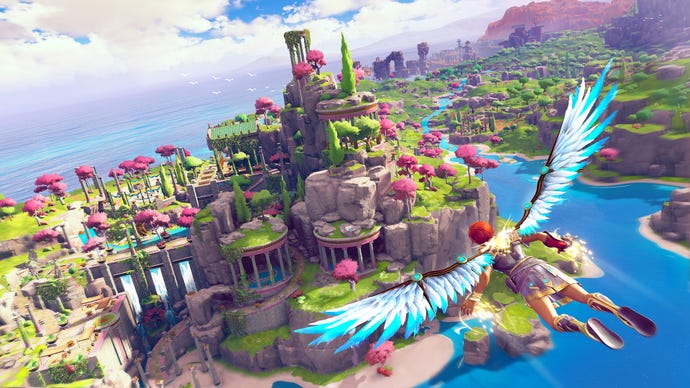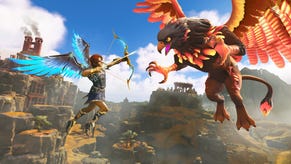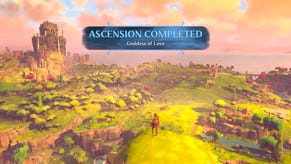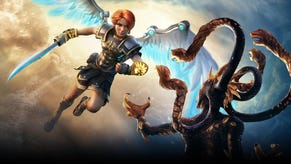Immortals Fenyx Rising is a Colorful Throwback to Classic 3D Platformers
A genre once lost is returning.
This article first appeared on USgamer, a partner publication of VG247. Some content, such as this article, has been migrated to VG247 for posterity after USgamer's closure - but it has not been edited or further vetted by the VG247 team.
The change in console generations has usually resulted in the death of certain genres. I remember sitting down, putting hours into arcade-style sports games like SSX and FIFA Street, or wild racing games like Burnout, Blur, and Split/Second. Some genres return, like the advent of Microsoft Flight Simulator in 2020 or Larian's upcoming CRPG Baldur's Gate, but many are simply consigned to the trash bin of gaming history.
If you jump back a generation or two, the 3D platformer was all the zeitgeist. These were the days of Ratchet & Clank, Jak and Daxter, Sly Cooper, Crash Bandicoot, Conker, and Sonic Adventure. For a while, these family-friendly games were the norm and had a place on every platform. These days, Microsoft and Sony tend to focus on older audiences, leaving the 3D platformer to Nintendo. We occasionally revisit this earlier era through games like the upcoming Ratchet & Clank: Rift Apart and Crash Bandicoot 4: It's About Time, but that's not the norm, and both of those required remakes to remind publishers, "Oh, people enjoyed these games for a reason."
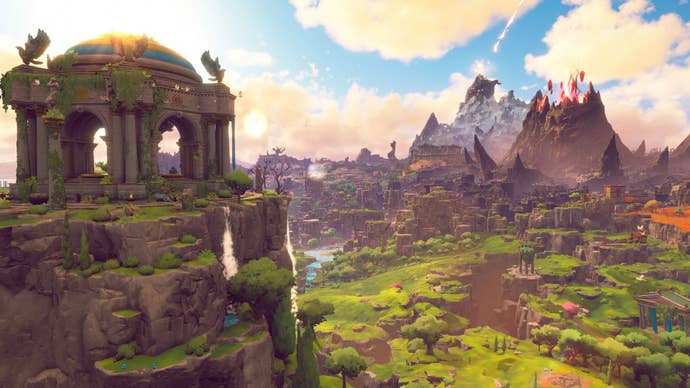
The oddly-named Immortals Fenyx Rising is a throwback to those halcyon days. It takes the foundation that Ubisoft Quebec established in Assassin's Creed Odyssey, and tries to deliver something new that feels like something old. For the studio, the work on Odyssey lit a fire within, a desire to keep working within Greek mythology.
"We really fell in love with the mythic aspect of that culture. We barely scratched the surface in Odyssey with some elements of the mythology, but we stayed within the limit of the Assassin's Creed brand," says Immortals Fenyx Rising associate game director Julien Galloudec. "After that we really wanted to create something that could embrace the whole potential of the Greek mythology. Those stories about gods and mythical creatures and epic adventures. So when we were thinking about our next game we decided to take all of that and create something fresh and very different from what we used to do before. That was the origin of the vision for Immortals Fenyx Rising."
My hands-on demo with Immortals actually begins with the heroine Fenyx scaling a large statue, similar to the large Zeus statue at the beginning of Assassin's Creed Odyssey. Immediately, the tone is different, with Zeus and Prometheus taking turns narrating the events of the game. Prometheus is the straight man, while Zeus is a mythological George Costanza, complaining about the story being told and breaking the fourth wall. Zeus even notes the change in the game's title. Immortals is a much lighter game than Odyssey was.
From the top of a statue of Hephaestus, Fenyx scans the world below, taking in the landscape and noting points of interest. Immortals bursts with what feels like Nintendo inspirations: the world itself feels similar in design to The Legend of Zelda: Breath of the Wild and Fenyx relies on stamina for gliding and climbing sheer rock walls. With the shock of reddish brown hair and the glowing Wings of Daedalus, the standard version of the main character also recalls Kid Icarus.
Galloudec downplays the comparison though, saying Immortals was inspired by "many, many games from many people." In fact, he points to those older games I mentioned earlier. "In terms of gameplay, we also wanted something a bit more platform-y, more action-based, more fantastical and acrobatic," he tells me. "So definitely, we have a bit of the nostalgia of the games from the early 2000s, like Ratchet and Clank, Jak and Daxter, and Banjo-Kazooie. An open-world that is dense; that is full of secrets and challenge."
While the demo had a single version of Fenyx, Galloudec confirms that players will be able to create their own character. You're able to choose between different body types, voices, skin tones, and hairstyles to craft your own version of Fenyx before diving into the colorful world of Greek myth.
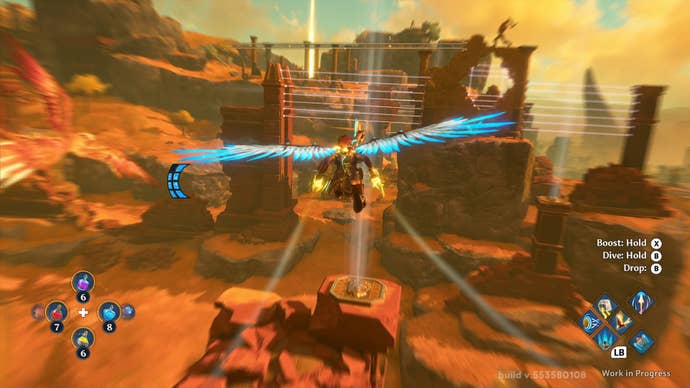
The land before me in the demo reflects Hephaestus's personality and powers as the god of fire and forges: a land of golden grass, smoldering flames, and metal clockwork monstrosities. Gliding from the top of the statue, I head toward a Vault of Tartarus. The entrance to the vault is a burning mini-volcano that needs to be shut to prevent the corruption of Typhon, the god destroyer, from tainting the world. To enter the vault, I must first defeat the burning gladiators and monsters that defend it.
Combat directly mirrors Assassin's Creed Odyssey, though the attacks are larger, full of magic and color. Enemies have a life bar and a stun meter, which you can increase with heavy attacks, special abilities, and parrying. Having survived over a hundred hours of Odyssey, these early fights were pretty easy.
Once inside the vault, I'm once again confronted with something that reminds me heavily of Breath of the Wild. The Vaults consist of small puzzles and platforming challenges that float in a cosmic void. The set of puzzles in the first vault involves moving boxes onto switches and figuring out how to move them past lasers and other obstacles. Fenyx's method of picking up larger boxes even recalls Link's Magnesis power. It's something new for Ubisoft Quebec though, but Galloudec admits building vaults is something the team really enjoyed.
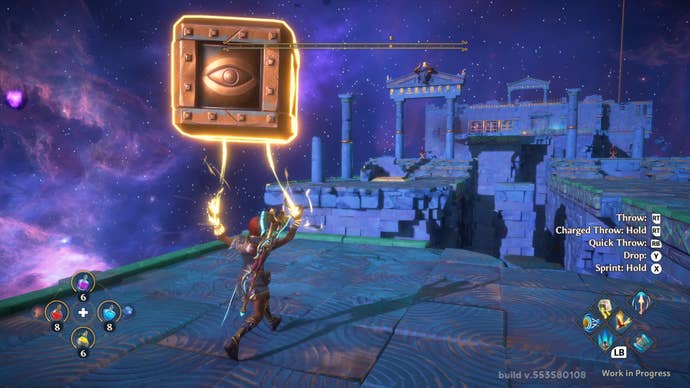
"That was quite a challenge at the beginning, because it was very new for us, but the team had a lot of fun building those Vaults of Tartarus, and it's probably one of the things we're most proud of," he says. "To be able to deliver those Vaults and to make them very unique. You get some stuff that is very puzzly, but some will be more oriented on platforming or dexterity."
That's very clear in the demo, as both vaults I tackle offer up some simple puzzles, with the latter focusing on Fenyx getting to the box in question, more than which switches need boxes. The puzzle nature extends to the open-world itself as well. For instance, I flew in a timed flight challenge, dodging laser grids and catching gusts of wind to push me higher toward the ultimate goal. In another spot, I pull a lever to light one torch, and then use that to light subsequent torches in order to access a chest. And Hephaestus' forge itself requires moving giant chunks of charcoal around, lighting them with torches or flaming arrows, and then throwing them in unlit braziers.
It's nothing like the kinds of events you tackle in Assassin's Creed Odyssey, and for all the gentle ribbing of the former Gods & Monsters, it does feel like a very different game. There are no quests, but there don't seem to be any NPC characters, or any sort of choices available to the player. It's a straightforward adventure with RPG systems.
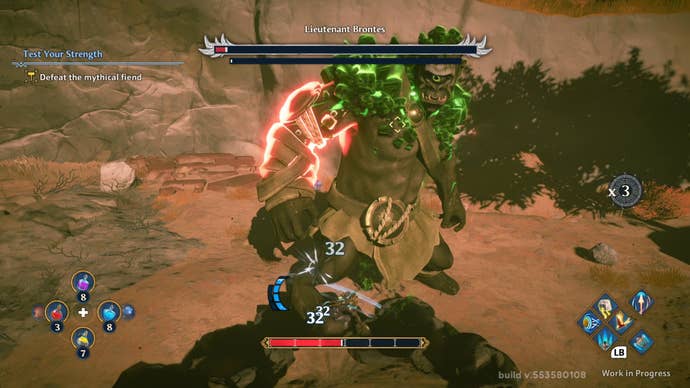
"Having something that was RPG in terms of storytelling, choices, and consequences was not the focus for this game," says Galloudec. "We preferred to explore more of the fantastical aspects of Greek mythology. That was something we wanted from the very beginning."
The world itself is also much more focused compared to Odyssey. That was a game that was almost too big for me, and I love vast open-world titles. Immortals Fenyx Rising is an open-world game, but smaller in size, and based around various Greek gods. I glided across most of the Forgelands region in the demo in 4-5 minutes, hammering home how much more focused Immortals is compared to Odyssey's ancient Greece.
Galloudec directly calls the world Ubisoft Quebec has built a theme park, one built for exploration and traversal. "We wanted to build a world that was larger than life and fantastical, to be true to the Greek mythology. The intention for us was to build a theme park of the Greek mythology. And also something with a lot of verticality, because we have exploration and traversal that is very dynamic, very risky and rewarding," he explains.
Given the theme park nature, there's less of a push toward naturalistic environments, where the landscape feels like a real place. Instead, Immortals' regions are built to reflect each god and provide a playground for the player to enjoy. "There is a clear change in biomes, in mood, and also enemies and the type of challenges you will encounter," says Galloudec. The War's Den region will obviously be dedicated to Ares, the god of war, but the associate director is mum on which other gods are in Immortals.
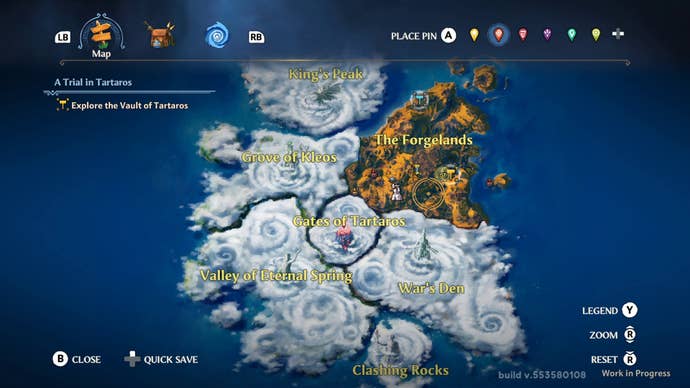
It's also clear that Ubisoft has learned from Breath of the Wild, whether Galloudec will admit it or not. The world itself is built with many peaks and valleys, allowing you to easily see various landmarks and new locations to explore. There are still Ubisoft towers, but it seems like there's only one per region, and they have a different focus rather than revealing events on the map.
"We have less [towers than] you can find in an Assassin's Creed game, but it's still an important beat within the quest of each god," says Galloudec. "So it's more a narrative tool and the bottle neck for exploration, rather than a systemic feature that you will find across the game."
This is a very different game than what I'd normally expect from Ubisoft; if you told me that Nintendo asked them to make a new Kid Icarus and this was the result, I wouldn't be surprised. But I had fun floating around the Forgelands, and amid the puzzles there are hints of other systems in Immortals, like taming horses to summon, crafting potions, and even epic-level world bosses. Immortals feels like a smaller, more focused throwback to an era that gaming left behind, and I'm glad to see Ubisoft returning to that era like Activision and Insomniac. Not everything needs to be a service game, full of microtransactions and systems that force you to play forever. I'm looking forward to a good 15-30 hours of mythical Greek adventure, so hopefully Immortal Fenyx Rising's final release delivers on that promise. Immortals Fenyx Rising is coming to PC, PlayStation 4, Xbox One, Nintendo Switch, and Google Stadia on December 3, 2020, and the game will be playable on PlayStation 5 and Xbox Series X.
